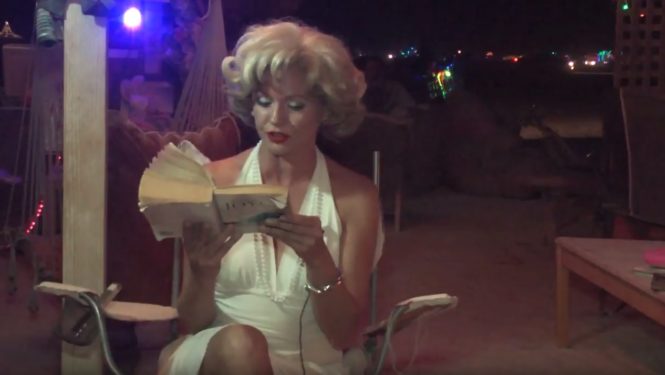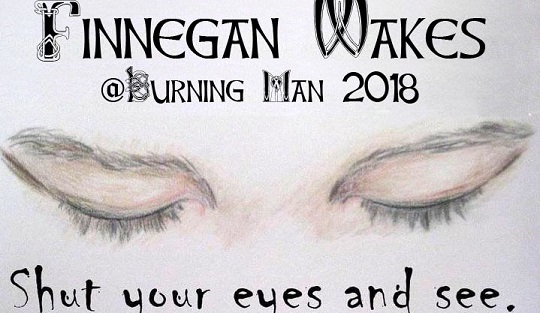By Gavan Kennedy
One of the many participatory events to unfold at this year’s Burning Man will be the return of the performance art project Finnegan Wakes. The project films Burners as they read one page of James Joyce’s outrageous epic novel, accompanied by a piece of wordless music that has had an impact on the participant’s life.
This year’s shoot will also feature a talk and series of workshops given by world-leading expert on Finnegans Wake, Finn Fordham, who will draw parallels between this epic tale and this year’s theme, I, Robot.
A large and complex work, Finnegans Wake is multilingual and polyvocal, and has always required a community of readers to bring it to life. Joyce took 17 years to write this last book, which he implored people to not simply READ, but to read it OUT LOUD, turn the signs into song and bring forth its music. Performing and listening to the Wake releases the powerful rhythms and melodies that Joyce embedded in the text.
Bringing Finnegan to Life
The goal of the art project is to set the entirety of Finnegans Wake (628 pages) to film. Here’s a brief snapshot of Burners radically Waking Finnegan last year.
Finnegans Wake is a resurrection story: a man presumed dead, laid out at his own funeral (or ‘wake’), is brought to wakefulness by the noise of his mourners as they fight over his reputation. Each time the work is read and wrangled over, the same thing happens: it arises off the page. The performance of every Burner gives birth to new participatory art that wakes Finnegan-again.
This year’s shoot will take place at Entheos Camp @ Esplanade and 3:45. Filming begins on Sunday night at 8:30PM and will shoot thru the night until 4AM, every night until Sat morning, Sept 1.
Finn will give his keynote address at Entheos Camp on Tuesday at noon, followed by a workshop at 2PM focusing on the film project. He will also give a nightly talk on the Wake at Entheos Camp before filming begins at 8PM.
Finn is Professor of 20th Century Literature at Royal Holloway, University of London and edited the Oxford World Classics edition of Finnegans Wake.
James Joyce’s estate also blocked the publication of his doctoral thesis on Joyce’s daughter, Lucia, and her impact on Joyce. His writings on the Wake have been published extensively and his book Lots of Fun at Finnegans Wake: Unravelling Universals is a wonderful gateway into the magical dream world of the book.
Finnegan Meets I,Robot
In his Tuesday talk, Finn will draw parallels between this year’s theme at Burning Man: I,Robot and Finnegan’s Wake. Here are some of his initial thoughts:
“At Burning Man, an upright built figure hosts a gathering of celebrants, before being set alight and disappearing into the air.
At Finnegans Wake a builder, Tim Finnegan, presumed dead by a host of celebrants, comes alive as a splash of whiskey falls on his face.
Seemingly different, these two events mirror their forms back to each other. Both require participation to come alive: both are interested in processes whereby construction and destruction co-exist. They are joined at the hip by such metaphors as the Phoenix. The finale of the Burn is like a Phoenix from whose ashes a new form will be born again. The process is cyclical — as is Joyce’s novel. Joyce varied the title of his book Finnegans Wake so that we realize we are watching a magical moment when ‘The Phoenician wakes’.
What can participating in the great text-machine of Finnegans Wake tell us about the theme of artificial intelligence and the human-machine interface? A great deal, it turns out, because Joyce imagined his work as a machine.
In my talk I will explore this idea of a text as a machine — a machine of memory and of meaning, which seems to have a life and an intelligence of its own.
Intelligence can be understood as a consequence of an evolved complex arrangement of matter. We tend to locate intelligence within the bounds of the human body, especially the brain, or mind. But this very intelligence also imagines itself elsewhere: in a thunderclap, a burning bush, a crowd, a termite colony, a computer, a corpse, and also a text — all can seem to have their own intelligence. Joyce was fully aware of such magical thinking.
It can produce the stuff of horror (whether that’s ‘Hal’ in 2001 or the monster in Mary Shelley’s Frankenstein) and humor (eg. Marvin the paranoid android). But in all cases, they indicate our attempts at understanding what it is to be human.
I will show that artificial intelligence is not just a feature of the Computer Age, but a variation on a theme, the timeless theme of human identity and its limits, which, as Marshall McLuhan and Joseph Campbell knew, James Joyce explored in his great work.”
If you and your camp comrades want to come down and radically partake in the lecture, the workshops and the recordings, you can sign up to the Finnegan Wakes Facebook page or find more information on our website.



This sounds like a remarkable project. The dawning of a new era is upon this book, no doubt.
Report comment
Read OUT LOUD. Aha! That’s the key. Will definitely partake in this wonderful project.
Report comment
I felt like a part of my humanity was was infused with new life after i read my page of Finnegan wakes a must do.
Report comment
I enjoy the magic experience of reading Finnegans Wake LOUD. In just moments one slips from just reading words and become to be part of the whole book… just pick a page and get united into it all… its like floating into the univers, becoming one with it… overwhelming!!!!
Report comment
While the music I had chosen was playing and setting my mind lose, reading the page of F Wake become like mantra which progressively took me away from reality. I felt being taken by hand along the very notes of the background sound by the master lyric maker and felt more and more relaxed and at peace. What an unexpected powerful and therapeutic experience!
Report comment
I felt like I was reading to Joyce’s kin – an amazing experience that I hope to replicate – go raibh maith agat!
Report comment
Reading aloud definitely has, or creates, a kind of music. Can’t wait to participate and contribute!
Report comment
Comments are closed.